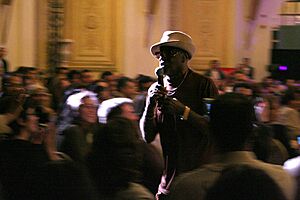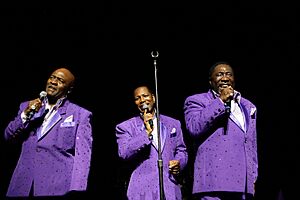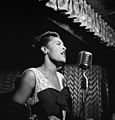Billy Paul facts for kids
Quick facts for kids
Billy Paul
|
|
|---|---|
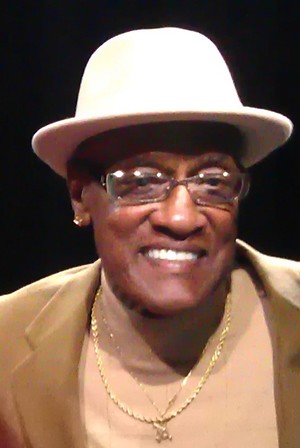
Paul in 2012
|
|
| Background information | |
| Birth name | Paul Williams |
| Born | December 1, 1934 Philadelphia, Pennsylvania, U.S. |
| Died | April 24, 2016 (aged 81) Blackwood, New Jersey, U.S. |
| Genres | Soul, R&B, jazz |
| Occupation(s) | Singer |
| Years active | 1952–2016 |
Paul Williams (born December 1, 1934 – died April 24, 2016), known as Billy Paul, was an American soul singer. He won a Grammy Award for his famous 1972 song "Me and Mrs. Jones", which became a number one hit. He was also known for his 1973 album War of the Gods, which mixed his pop, soul, and funk music styles with electronic sounds.
Billy Paul was one of the many artists connected to the "Philadelphia soul" sound. This special sound was created by music producers Kenny Gamble, Leon Huff, and Thom Bell. People recognized Billy Paul by his unique voice, which could be soft and soulful or deep and rough. Questlove, a famous musician from the Roots, even compared Billy Paul to music legends like Marvin Gaye and Stevie Wonder.
Contents
Life and Music Career
Starting Out
Billy Paul grew up in North Philadelphia. He loved music from a young age, listening to his family's record collection at home.
He remembered that his mother collected many records, from jazz to Nat King Cole. He started singing along and tried to sound like the singers he heard. He especially liked Nat King Cole, Dinah Washington, Sarah Vaughan, Ella Fitzgerald, and Nina Simone. He wanted his singing to be smooth and mellow, like "butter."
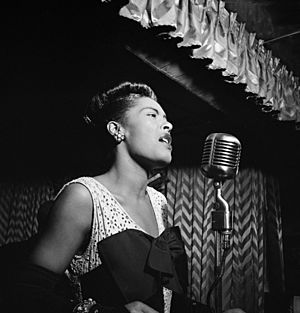
Billy Paul explained that he was very influenced by female jazz singers. He said that male singers with his vocal range didn't inspire him as much. But listening to singers like Nina Simone or Nancy Wilson made him feel "in seventh heaven." He felt female singers did more with their voices. Billie Holiday was a "BIG influence" on him. He began to create his own singing style, mixing jazz, R&B, and pop.
He started singing professionally at age 11 on a local radio station called WPEN. He also took singing lessons at the West Philadelphia Music School and the Granoff School of Music. He said these lessons helped him hold notes and deliver them well. He always wanted to sound like himself, not like anyone else. He treated his voice like a musical instrument, like a saxophone, which helped him create his unique style.
As Billy Paul became more popular, he performed in clubs and at colleges. He changed his name from Paul Williams to Billy Paul to avoid confusion with other artists. His manager, Jules Malvin, gave him the name Billy Paul when he performed at the Apollo Theater.
First Songs
In 1952, Billy Paul went to New York City to record his first songs for Jubilee Records. He released his first single, "Why Am I," with "That's Why I Dream" as the B-side. Billboard magazine liked the songs, calling "Why Am I" an "expressive warbling of a moody ballad."
Later in 1952, he released his second single, "You Didn't Know." Billboard was positive again, saying he made an "impressive bow" with his strong performance. Even though Jubilee Records promoted him, his early songs did not become big hits.
Army Service and Return to Music
Billy Paul's music career paused when he joined the Armed Services. He was part of the 7th Army Band in Germany, along with other musicians like Don Ellis. They used their time in the Army to improve their music skills.
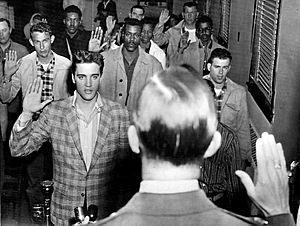
After his time in the Army, Billy Paul formed a jazz trio. In 1959, he released the single "Ebony Woman." In 1960, he recorded "There's a Small Hotel". These songs also did not become hits, but he would re-record them later.
For a short time, Billy Paul filled in for a singer in Harold Melvin and the Blue Notes. He also spent six months with the Flamingos. During this time, he became close friends with Marvin Gaye. They were like brothers, and Billy Paul often relied on Marvin Gaye to check on his wife's mother when he was traveling.
The Philadelphia Soul Sound
In 2012, Billy Paul talked about how important Philadelphia was to him and what the "Philly sound" meant. He said it was very important because he was born there, and many great artists came from the city. He described the Philly sound as having its own unique "beat" that sounds easy but is actually hard to play.
Working with Gamble and Huff
Billy Paul and his wife, Blanche Williams, were recording his first album when they met Kenny Gamble.
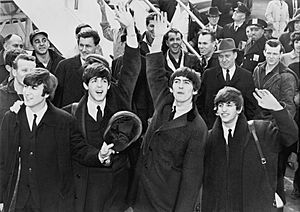
Billy Paul's first album, Feelin' Good at the Cadillac Club, came out in 1968. It was mostly jazz songs that other artists had made popular. The album and its single "Bluesette" did not make it onto the music charts.
His second album, Ebony Woman (1970), was more focused on commercial success. It was released on Gamble & Huff's Neptune label. Billy Paul re-recorded his 1959 song "Ebony Woman" as the title track. This album mixed jazz and soul music. It did well, reaching No. 12 on the Billboard soul chart and No. 183 on the pop chart.
After Neptune Records closed, Gamble and Huff started a new label called Philadelphia International Records (PIR). They brought Billy Paul with them. PIR then made a deal with Clive Davis and CBS Records to distribute their music.
Going East (1971) was Billy Paul's first album on Philadelphia International Records. It used the label's talented musicians, MFSB, at Sigma Sound Studios. Gamble and Huff tried to balance Billy Paul's jazz roots with the funky soul music they hoped would make him famous. The album reached No. 42 on the Billboard soul chart.
"Me and Mrs. Jones" and Global Fame
With each album, Gamble and Huff got closer to the sound they wanted for Billy Paul. They finally achieved it with the 1972 album 360 Degrees of Billy Paul and the song "Me and Mrs. Jones". Both the album and the song were very popular and received great reviews.
"Me and Mrs. Jones" was the number one song for the last three weeks of 1972. It sold two million copies, earning a platinum award. The song also won Billy Paul a Grammy Award. This success made him famous around the world, including in the United Kingdom, where the song reached No. 12. Many artists have covered the song since then, including Michael Bublé in 2007.
Billy Paul remembered winning the Grammy: "Oh man! I was up against Ray Charles, I was up against Curtis Mayfield, I was up against Isaac Hayes." He called the song a "masterpiece" and a "classic."
"Me and Mrs. Jones" was the first number one hit for Philadelphia International Records. The label was also very successful with other artists like the O'Jays and Harold Melvin & the Blue Notes. Billy Paul described the atmosphere at the label as "like a family full of music."
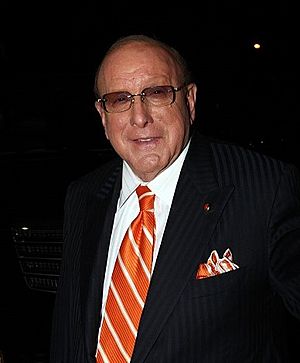
Later PIR Recordings
Billy Paul released Only the Strong Survive in 1977. This was his last album to appear on the music charts, reaching No. 152 on the Pop chart and No. 36 on the Soul chart. The song "Only the Strong Survive" was the first single from the album.
Later in 1977, Billy Paul was featured on the song "Let's Clean Up the Ghetto" with other artists from Philadelphia International. This song reached No. 91 on the Pop chart and No. 4 on the Soul chart. All the money from the album and single went to help inner-city areas across the U.S.
Billy Paul's last studio album for Philadelphia International Records was First Class, released in 1979. It did not make it onto the Pop or Soul charts. A disco version of the song "Bring the Family Back" reached No. 90 on the Soul chart.
His time at Philadelphia International officially ended with the 1980 album Best of Billy Paul. This album included four songs that had not been released before. One of these songs, "You're My Sweetness," reached No. 69 on the Soul chart.
Many "best of" collections of Billy Paul's music have been released over the years. Critics often say that most of these collections don't fully show how talented he was. Some critics believe that if his record company had chosen his singles better, his career might have been even more famous.
After Philadelphia International Records
Billy Paul made two more studio albums in the 1980s. The first, Lately, came out in 1985. It had a different sound from his earlier music, using more synthesizers. The second album, Wide Open, was released in 1988 and reached No. 61 on the Soul chart.
Later Years and Performances
Billy Paul announced he was retiring in 1989. However, like many artists, he couldn't stop performing live and recording music. In 2009, when asked if he was enjoying retirement, he replied, "Retired? Are you serious?"
After his "retirement," Billy Paul regularly toured in the U.S. and other countries. He played in clubs, hotels, and at jazz festivals. He said that performing in his hometown of Philadelphia was special, but he also had great audiences in places like Paris and Brazil. His song "Me and Mrs. Jones" was popular everywhere.
In 2000, he released a live CD called Live World Tour 1999–2000 on his own label. It included recordings from concerts in Brazil, France, Bermuda, and Philadelphia. Two years later, a full show from that tour was released outside the U.S. called Your Songs: Live in Paris.
Billy Paul's concerts included his own songs and covers of jazz, soul, rock, and pop tunes. For example, one show in Philadelphia featured songs like "Ebony Woman" and "Me and Mrs. Jones." Another show in Brazil included "Thanks for Saving My Life" and "You Are So Beautiful."
Lawsuits for "Me and Mrs. Jones"
In 2000, the company Nike used Billy Paul's song "Me and Mrs. Jones" in a TV commercial without his permission. The ad featured athlete Marion Jones. Billy Paul sued Nike and their advertising agency for $1 million in unpaid fees.
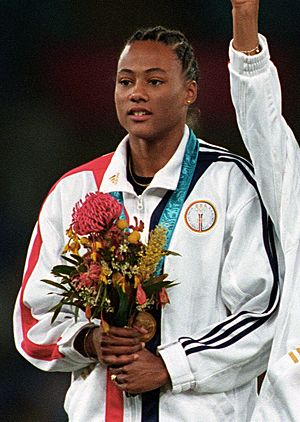
After the Nike lawsuit, Billy Paul also sued his former record company, Philadelphia International Records, for unpaid money from his famous song. He said he had not received a statement about his earnings in 27 years. He sued the company and its owners, Kenny Gamble and Leon Huff, for nearly half a million dollars.
In the 2003 trial, the company argued that Billy Paul owed them money for recording and producing his albums. However, the jury decided that Billy Paul did not owe the company anything. Instead, they awarded him half a million dollars in unpaid money for "Me and Mrs. Jones."
Billy Paul said he was "so glad" his "path to justice" had ended. His lawyer, Steven Ames Brown, called it a "stunning victory." This case was important for other artists, including Archie Bell and the O'Jays, who also sued Gamble & Huff for unpaid money.
Movie About Billy Paul
In 2009, a movie about Billy Paul called Am I Black Enough for You? was released. It was directed by Göran Hugo Olsson from Sweden. The movie showed Billy Paul's life story, including his early days and the challenges he faced.
Billy Paul explained why he agreed to make the movie. He wanted to share his "highs and lows" and "release his heart." He said the filmmakers were big fans and that he trusted them. He felt the movie helped him "get rid of a lot of demons" and find "peace with myself."
Recent Activities
In 2011, Billy Paul sang a duet with French singer Chimène Badi on the song "Ain't No Mountain High Enough".
Also in 2011, to celebrate the 40th anniversary of Philadelphia International Records, many of the label's albums were re-released. These included Billy Paul's works, with new notes and interviews. A live album from 1973, Golden Gate Groove, was also released, featuring Billy Paul performing "East" and "Me and Mrs. Jones".
Awards and Recognition
Besides his Grammy Award for "Me and Mrs. Jones", Billy Paul received several other honors. He won awards from Ebony magazine and an American Music Award. He also received the NAACP Image Award and many "keys to cities" across the United States. In 2015, he received the AMG Favorite Retro Artist of the Year award and the Sandy Hosey Lifetime Achievement Award.
In 2010, Questlove from the Roots compared Billy Paul to music legends Marvin Gaye and Stevie Wonder.
Death
Billy Paul passed away on April 24, 2016, at his home in Blackwood, New Jersey. He was 81 years old and died from pancreatic cancer. He is buried in Pennsylvania.
Music Albums
| Year | Album | Label | Highest Chart Position | |||
|---|---|---|---|---|---|---|
| US |
US R&B |
|||||
| 1968 | Feelin' Good at the Cadillac Club | Gamble SG 5002 | — | — | ||
| 1970 | Ebony Woman | Neptune NLPS 201 | 183 | 12 | ||
| 1971 | Going East | Philadelphia International KZ 30580 | 197 | 42 | ||
| 1972 | 360 Degrees of Billy Paul | Philadelphia International KZ 31793 | 17 | 1 | ||
| 1973 | War of the Gods | Philadelphia International KZ 32409 | 110 | 12 | ||
| 1975 | Got My Head on Straight | Philadelphia International KZ 33157 | 140 | 20 | ||
| When Love is New | Philadelphia International KZ 33843 | 139 | 17 | |||
| 1976 | Let 'Em In | Philadelphia International KZ 34389 | 88 | 27 | ||
| 1977 | Only the Strong Survive | Philadelphia International KZ 34923 | 152 | 36 | ||
| 1979 | First Class | Philadelphia International KZ 35756 | — | — | ||
| Best of Billy Paul | Philadelphia International Z 2-36314 | 205 | 58 | |||
| 1985 | Lately | Total Experience TEL8-5711 | — | — | ||
| 1988 | Wide Open | Ichiban ICH 1025 | — | 61 | ||
| "—" means the album did not chart or was not released in that area. | ||||||
Singles
| Year | Label | Single (A-side / B-side) | Highest Chart Position | Awards | |||
|---|---|---|---|---|---|---|---|
| US |
US R&B |
AUS |
UK |
||||
| 1952 | Jubilee 5081 | "Why Am I" / "That's Why I Dream" | — | — | — | — | |
| Jubilee 5086 | "You Didn't Know" / "The Stars Are Mine" | — | — | — | — | ||
| 1959 | New Dawn 1001 | "Ebony Woman" / "You'll Go to Hell" | — | — | — | — | |
| 1960 | Finch 1005 | "There's a Small Hotel" / "I'm Always a Brother" | — | — | — | — | |
| 1969 | Gamble 232 | "Bluesette" / "Somewhere" | — | — | — | — | |
| 1970 | Neptune 30 | "Let's Fall in Love All Over" / "Mrs. Robinson" | — | — | — | — | |
| 1971 | Philadelphia International 3509 | "Magic Carpet Ride" / "Love Buddies" | — | — | — | — | |
| 1972 | Epic 1313 | "Brown Baby" / "It's Too Late" (UK only) | — | — | — | — | |
| Philadelphia International 3515 | "This Is Your Life" / "I Wish It Were Yesterday" | — | — | — | — | ||
| Philadelphia International 3521 | "Me and Mrs. Jones" / "Your Song" | 1 | 1 | 9 | 12 |
|
|
| 1973 | Philadelphia International 3526 | "Am I Black Enough for You?" / "I'm Gonna Make It This Time" | 79 | 29 | — | — | |
| Philadelphia International 3538 | "Thanks for Saving My Life" / "I Was Married" | 37 | 9 | — | 33 | ||
| 1974 | Philadelphia International 3551 | "Be Truthful to Me" / "I Wish It Were Yesterday" | — | 37 | — | — | |
| Philadelphia International 2225 | "The Whole Town's Talking" / "I Was Married" (UK only) | — | — | — | — | ||
| 1975 | Philadelphia International 3563 | "Billy's Back Home" / "I've Got So Much to Live For" | — | 52 | — | — | |
| Philadelphia International 3572 | "July July July July" / "When It's Your Time to Go" | — | — | — | — | ||
| 1976 | Philadelphia International 3584 | "Let's Make a Baby" / My Head's on Straight" | 83 | 18 | — | 30 | |
| Philadelphia International 3593 | "People Power" / "I Want Cha Baby" | — | 82 | — | — | ||
| 1977 | Philadelphia International 3613 | "How Good Is Your Game" / "I Think I'll Stay Home Today" | — | 50 | — | — | |
| Philadelphia International 3621 | "Let 'Em In" / "We All Got a Mission" | — | 91 | — | 26 | ||
| Philadelphia International 3630 | "I Trust You" / "Love Won't Come Easy" | — | 79 | — | — | ||
| Philadelphia International 5038 | "Without You" / "Word Sure Gets Around" (Italy only) | — | — | — | — | ||
| Philadelphia International 5391 | "Your Song" / "How Good Is Your Game" (UK only) | — | — | — | 37 | ||
| Philadelphia International 3635 | "Only the Strong Survive" / "Where I Belong" | — | 68 | — | 33 | ||
| Philadelphia International 3636 | "Let's Clean Up the Ghetto" / "Let's Clean Up the Ghetto" | 91 | 4 | — | — | ||
| 1978 | Philadelphia International 3639 | "Sooner or Later" / "Everybody's Breaking Up" | — | — | — | — | |
| Philadelphia International 5983 | "Everybody's Breaking Up" / "One Man's Junk" (UK only) | — | — | — | — | ||
| Philadelphia International 3645 | "Don't Give Up on Us" / "One Man's Junk" | — | — | — | — | ||
| 1979 | Philadelphia International 3676 | "Bring the Family Back" / "It's Critical" | — | 90 | — | 51 | |
| Philadelphia International 3699 | "False Faces" / "I Gotta Put This Life Down" | — | — | — | — | ||
| 1980 | Philadelphia International 3736 | "You're My Sweetness" / "Me and Mrs. Jones" | — | 69 | — | — | |
| Philadelphia International 3737 | "Jesus Boy (You Only Look Like a Man)" / "Love Buddies" | — | — | — | — | ||
| 1985 | Total Experience 49899 | "Lately" / "I Search No More" (UK only) | — | — | — | — | |
| Total Experience 49934 | "I Only Have Eyes for You" (UK only) | — | — | — | 80 | ||
| 1988 | Ichiban 88–141 | "We Could Have Been" / "I'd Rather Be Alone" | — | — | — | — | |
| Ichiban 88–150 | "I Just Love You So Much" / "This May Be Love" | — | — | — | — | ||
| 2011 | "Me and Mrs. Jones" | — | — | — | 177 | ||
| "—" means the single did not chart or was not released in that area. | |||||||
Filmography
- 2009, Am I Black Enough for You? (Cert 12A), Director: Göran Hugo Olsson
See also
 In Spanish: Billy Paul para niños
In Spanish: Billy Paul para niños
- List of 1970s one-hit wonders in the United States
Images for kids
-
Billy Paul was greatly influenced by female jazz singers like Billie Holiday.
-
Billy Paul served in the Army with Elvis Presley.
-
Billy Paul said the Beatles helped him move from jazz to other music styles.
-
Music executive Clive Davis often praised Billy Paul's song "Am I Black Enough for You?".
-
Olympic athlete Marion Jones was in a Nike commercial that used Billy Paul's song without his permission.
 | Stephanie Wilson |
 | Charles Bolden |
 | Ronald McNair |
 | Frederick D. Gregory |


